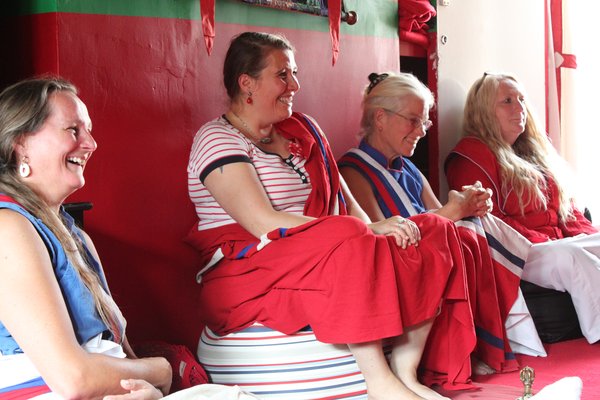The Aro gTér apprenticeship programme exists for Buddhists who wish to develop their practice from general Buddhism into this specific tradition. It is for those who seek the guidance of a Lama in their personal practice and who are enthusiastic about contributing to the Aro gTér lineage and Sangha.
Central to apprenticeship is relationship with the Lama or Lamas.
A Lama is a spiritual guide who: knows you personally; follows the details of your life and spiritual development — and answers your questions on that basis in terms of devising an individual course of study and practice. The relationship is cordial and informal. Apprentices may communicate extensively with their Lamas by email and telephone, and meet them for personal interviews. Apprentices also interact with the Lama in small groups, at social gatherings, spontaneous teaching occasions, and in the course of project work.
Apprentices are entitled to attend apprentice-only retreats with their own Lamas, and often also with other Aro Lamas. Apprentice retreats are less structured than public retreats, but more intensive. They involve a more focussed sense of practice, deeper levels of teaching, and the enjoyment of close friendships within the sangha.
Only apprentices have access to the Aro apprentice web site, which provides a variety of resources for practice and study.
Requirements
There are prerequisites for entering apprenticeship which avoid wasting the efforts of candidates, the Lamas, and committed apprentices. Among the prerequisites are:
- some experience and understanding of Buddhist practice and view;
- having attended at least one (preferably two or more) Aro gTér public retreats with the Lama or teaching couple of whom you wish to be an apprentice;
- having read several of the books by Aro gTér Lamas; and
- a willingness to devote substantial effort both to personal development and to the lineage.
Apprenticeship may be likened to embarking on a monogamous relationship of open-ended duration. It is not suitable for those who are actively pursuing other spiritual paths. Aro gTér Lamas encourage their students to learn from other Buddhist traditions but because apprenticeship involves substantial effort, other studies must be secondary. Apprenticeship is not a permanent commitment; one may leave on good terms at any point. (By contrast, ordination is a permanent commitment.) Be that as it may, it takes a year at least to develop a good functional rapport with the Lamas, so it is only useful to undertake apprenticeship if you are reasonably confident that it may be a lasting commitment.
If you are inspired by the Aro gTér teachings — but are not yet ready for apprenticeship, Aro gTér Mentorship may be a good option.
Apprenticeship or Mentorship?
Apprenticeship and Mentorship are superficially similar in that they both involve a one-to-one relationship. The relationships and the nature of the teaching are quite different, however.
- You can be mentored without belonging to a specific Buddhist tradition. You may simply want guidance in your meditation practice whereas apprenticeship is not possible without taking refuge and bodhisattva vows.
- Being in the Aro gTér Mentorship programme, you may be actively investigating other spiritual paths simultaneously. Apprenticeship implies commitment, at least for the time being, to the Aro gTér as your spiritual home.
- Apprentices are typically expected to attend apprentice-only retreats with their Lamas twice a year. If this is not feasible, due to geographical or time constraints, Mentorship may be a better option.
- The relationship with a Lama takes years to build. The Lama must get to know you well enough personally so that they can advise you accurately. It therefore only makes sense to begin apprenticeship if you are reasonably confident that the relationship may endure. Mentorship, on the other hand, is on a month-to-month basis. It is acceptable to experiment for a few months to see if it is useful — and to end it at any time.
- You can change mentors at any time. Changing Lamas is uncommon.
- Mentorship can be a good preparation for apprenticeship. However having been in the Mentorship programme is not a prerequisite for apprenticeship; you may wish to enter apprenticeship directly.
- Only Lamas can give the empowerments and teachings necessary for authentic Vajrayana practice. It is possible to engage in a Vajrayana practice after empowerment from a Lama who is not your personal teacher. However, as you go further, a relationship with a Lama is definitively necessary.
- Apprenticeship enables you to become part of a close-knit community. Taking refuge as a Buddhist, entails taking refuge in the sangha. Apprentices are often each other’s closest friends, and meet regularly to enjoy each other’s company in secular settings.
Qualities of apprentices
Apprenticeship requires the qualities of kindness, openness, enthusiasm, responsibility, and courage.
Kindness: Becoming an apprentice involves not only a close relationship with Lamas, but also with fellow apprentices: a whole family of Vajrayana practitioners who work, play, and practise together in a spirit of friendship, liveliness, humour, and generosity.
Openness: For the Lamas to be useful, apprentices must be receptive to suggestion, advice, and guidance in practice. One need should consider suggestions seriously.
Enthusiasm: Apprenticeship requires enthusiasm for the Aro gTér lineage and a significant commitment of time and energy. It is nevertheless suitable for people with demanding lives, careers, and families. The Aro gTér Lamas recognise that those with such commitments may have less time available for formal practice and retreat.
Responsibility: Lamas are not parental figures even though they assume a pastoral role. They are not psychotherapists even though they probe the psychology of perception. Apprentices are responsible for their own development and life-choices and for their part in creating the joyous atmosphere of the Sangha.
Courage: Apprenticeship can be joyfully bewildering, supportively confrontational, and relaxedly demanding. It can stretch limitations, inspiring the motivation to reach full personal capacity. A sense of gleeful abandon is needed alongside the capacity for determined effort. One needs to have the spirit which could contemplate a parachute jump. Fearlessness is not essential — but being open and willing is necessary.
Application process
If you have questions about the Aro gTér apprenticeship programme, contact apprenticeship@arobuddhism.org.
Apprenticeship is a personal relationship with a specific Lama or Lama couple. Each may have a different application process. Consult their individual web page for details.








